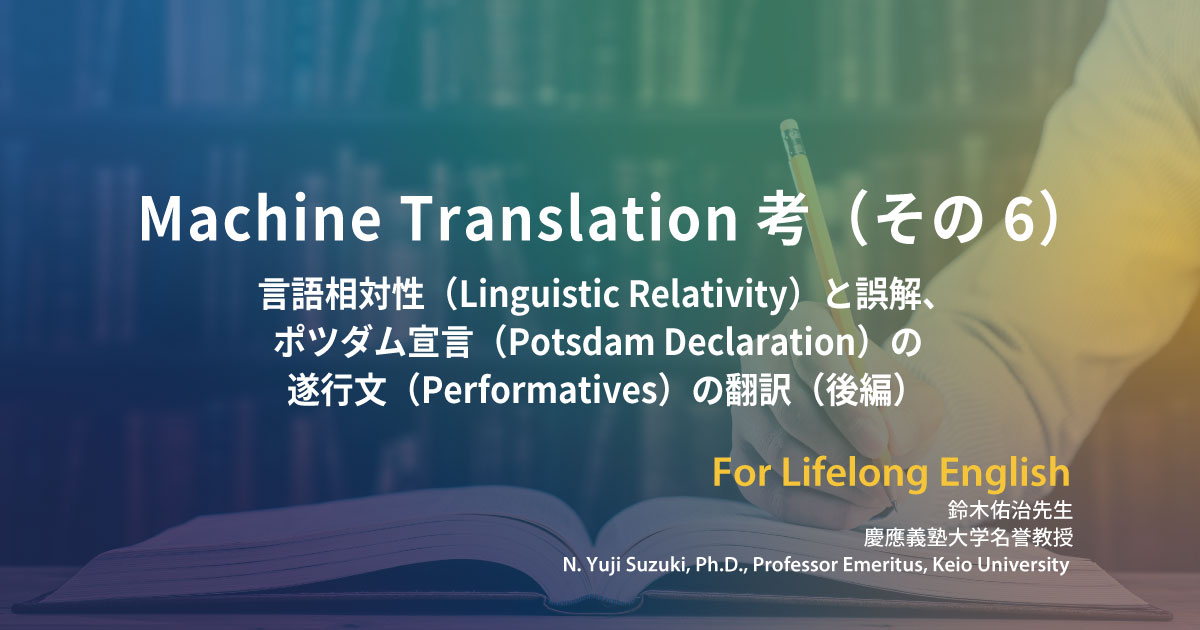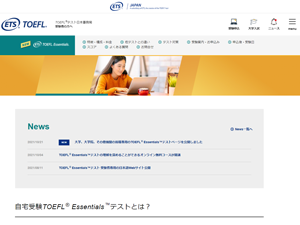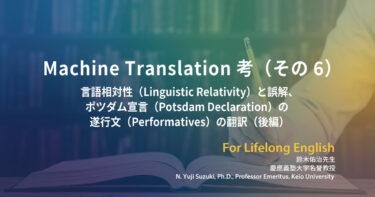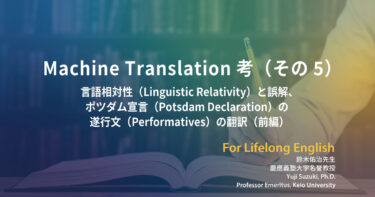
第168回(前編)に続く(後編)です。1945年7月に発せられたPotsdam Declarationは、トルーマン大統領を筆頭とする米国政府とチャーチル首相を筆頭とする英国政府主導で起案されたことは間違いありません。両国はキリスト教の伝統と価値観を受け継ぐ国家です。米国大統領は就任式(Inauguration)で、英国国王は戴冠式(Coronation)で聖書(The Bible)に手を置き大統領就任、王位継承を誓います。Potsdam Declarationにもキリスト教的伝統の影響がおよび、King James Version Bibleの旧約聖書出エジプト記20章(Exodus 20)のモーセの十戒(Ten Commandments)のスタイルに酷似しています。17世紀の近世英語で書かれていますが、英語圏留学を希望する読者は是非読んでください。
Exodus (出エジプト記)20
[1] And God spake (spoke) all these words, saying,[2] I am the LORD thy God, which have brought thee out of the land of Egypt, out of the house of bondage.
[3] Thou shalt (shall) have no other gods before me.
[4] Thou shalt not make unto thee any graven image, or any likeness of any thing that is in heaven above, or that is in the earth beneath, or that is in the water under the earth:
[5] Thou shalt not bow down thyself to them, nor serve them: for I the LORD thy God am a jealous God, visiting the iniquity of the fathers upon the children unto the third and fourth generation of them that hate me;
[6] And shewing (showing) mercy unto thousands of them that love me, and keep my commandments.
[7] Thou shalt not take the name of the LORD thy God in vain; for the LORD will not hold him guiltless that taketh his name in vain.
[8] Remember the sabbath day, to keep it holy.
[9] Six days shalt thou labour, and do all thy work:
[10] But the seventh day is the sabbath of the LORD thy God: in it thou shalt not do any work, thou, nor thy son, nor thy daughter, thy manservant, nor thy maidservant, nor thy cattle, nor thy stranger that is within thy gates:
[11] For in six days the LORD made heaven and earth, the sea, and all that in them is, and rested the seventh day: wherefore the LORD blessed the sabbath day, and hallowed it.
[12] Honour thy father and thy mother: that thy days may be long upon the land which the LORD thy God giveth thee.
[13] Thou shalt not kill.
[14] Thou shalt not commit adultery.
[15] Thou shalt not steal.
[16] Thou shalt not bear false witness against thy neighbour.
[17] Thou shalt not covet thy neighbour’s house, thou shalt not covet thy neighbour’s wife, nor his manservant, nor his maidservant, nor his ox, nor his ass, nor any thing that is thy neighbour’s.
[18] And all the people saw the thunderings, and the lightnings, and the noise of the trumpet, and the mountain smoking: and when the people saw it, they removed, and stood afar off.
[19] And they said unto Moses, Speak thou with us, and we will hear: but let not God speak with us, lest we die.
[20] And Moses said unto the people, Fear not: for God is come to prove you, and that his fear may be before your faces, that ye sin not.
[21] And the people stood afar off, and Moses drew near unto the thick darkness where God was.
[22] And the LORD said unto Moses, Thus thou shalt say unto the children of Israel, Ye have seen that I have talked with you from heaven.
[23] Ye shall not make with me gods of silver, neither shall ye make unto you gods of gold.
[24] An altar of earth thou shalt make unto me, and shalt sacrifice thereon thy burnt offerings, and thy peace offerings, thy sheep, and thine oxen: in all places where I record my name I will come unto thee, and I will bless thee.
[25] And if thou wilt make me an altar of stone, thou shalt not build it of hewn stone: for if thou lift up thy tool upon it, thou hast polluted it.
[26] Neither shalt thou go up by steps unto mine altar, that thy nakedness be not discovered thereon.

(The Holy Bible, The Authorized King James Version)
出エジプト記(Exodus)は、エジプトで捕囚されていたイスラエル民族が、エジプトを脱出しシナイ半島の荒野を40年間さまよった末に約束の地に辿り着くまでを記録したものですが、The Oxford Annotated Bible 『オックスフォード注釈付き聖書』は、中心テーマは20章3節から26節に記された十戒に集約される契約(Covenant)であるとコメントしています。[1]

(The Oxford Annotated Bible1962)
イスラエル民族がエジプトの束縛より解き放ったエホバの神(出エジプト記1節2節)を崇め、
(Exodus 20:1,2)
十戒を遵守することによりその加護を受けるという契約(Covenant)です。エホバの神(“I”)が(直接声を聞くことを許した)モーセを介して同民族(“thou=you”)に発したとされる厳かな託宣です。それを反映し、例えば、13節“You(thou) shall not kill.”は、第168回(前編)で紹介したG. N. Leech(1971)のMeaning and the English Verb 4章“The Modal Auxiliaries”法助動詞の分析が示すように、“I (the speaker), your (thy) God, insist that you(thou) kill not.”(我、汝らの神は汝ら人を殺すなかれと命ず) に置き換えられので、Declarations(宣言)に当たる遂行文(performative)です。
同用法の“shall”は、出エジプト記に続き礼拝儀礼を詳細に記した別称礼拝の書(The book of worship)と呼ばれるレビ記、また、十戒の契約(Covenant)を改定し第二の法(second law)と称される申命記(Deuteronomy)[2]にも頻出します。西洋のキリスト教世界の法律の原点はこれらの書に遡ると言われ、Leech(1971)が指摘するように英語の法律文には同用法の“shall”が頻出します。
Potsdam Declarationの構成、文言、スタイルは出エジプト記20章に似ています。13項ありますが、最初の1項〜5項までは、出エジプト記20章1節と2節に当たる部分で、日本が連合国に無条件降伏すべき背景と事由が明記されています。連合国側が命令する側で日本は命令されてしかるべき側と位置付けます。十戒本体に相当するのは6項〜13項ですが、十戒と同じように“shall”= the speaker’s strong volition (insistence)が頻出します。
しかしながら、どの項目においても“shall”に続く動詞が受動態であることが十戒と異なります。十戒は、エホバの神(“I”)がイスラエル民族(“thou”)に(モーセを介し)直に下した託宣であるので、出エジプト記20章25節のように、
“shall”文の主格は“thou”で続く動詞は能動態“build”です。意味的には、“I insist that thou(=Israelites) build not..”になります。ところが、レビ記15章12節
And the vessel of earth, that he toucheth(touches), which hath the issue, shall be broken: and every vessel of wood shall be rinsed in water.
では、内容は似ているものの“shall”に続く動詞は受動態“be broken”/“be rinsed”で、文の主格は“thou”ではなく“the vessel of earth/every vessel of wood”です。しかし、それは表層構造であって、その深層構造は“I insist that thou shall break the vessel of earth… thou rinse every vessel of wood in water”という能動形の文で、それを受動形に変換したものです。発信者“I”が受信者“thou”に〜せよと命令する構造には変わりがありません。
なぜ受動態なのでしょうか。それは発信者が自分は神ではないこと、単に神の代弁者であることを強調したいからでしょう。十戒はみだりに神の名を唱えることさえ禁じ(出エジプト記20章7節)、ましてや、恰も神であるかのような物言いは冒涜とされます。後でも触れますが、そうした疑いを緩衝する一つの方策として受動態が使われているだけで、これらの“shall”文がDeclaration(宣言)に属する遂行文であることに変わりがありません。十戒はその英訳Ten Commandmentsが示すとおり命令です。十戒の“shall”文から“thou shalt(shall)”を省くと(delete)命令形になります(“Thou shalt not steal.”→“Do not steal.”)。受動形の文でも同じです。能動形の文に戻し主語と“shall”を除けば命令形になります。ただし、命令形には強制力のある指令(“Do not kill.”)から依頼(“Pass me the salt.”)まで幅広い用法がありますが、[3] この用法の“shall (shalt)”は強制力が強く、話者=権力者、聞き手=非権力者という上下関係が余韻(overtones)として残ります。
Potsdam Declaration中の“shall”を伴う遂行文(performatives)をチェックしてみましょう。 5項
における“shall”は、第168回(前編)で触れたLeech (1971)の例文を参照すると、the speaker’s strong volition (insistence)ではなく、the speaker’s intention (intermediate volition)の“shall”に当てはまります。統語構造上、前者の用法では主語が二人称か三人称であるのに対し、後者の用法は、“I shall write tomorrow.”や“We shall stop your pocket money if you don’t behave.” のように主語が一人称であるからです。主語の意思を示す“will”とほぼ同意味で、現在英語では“I will write tomorrow.”とか“We will stop your money.”のように“will”が主流ですが、“I shall write tomorrow.”“We shall stop your money.”は文の主語としての意志に話者としての意志が加わるので 強固な意志(the speaker’s firm determination)が余韻(overtones)として残ります。Douglas MacArthurの“I came through and I shall return.”がその一例です。
この“shall”を“will”に置き換えるとthe speaker’s firm determinationという余韻(overtones)は伝わりません。“We shall brook no delay.”には主語としての意志に発信者として意志が加わるのでthe speaker’s firm determinationとして伝わるわけです。もちろん、この文の“shall”をthe speaker’s strong volition(insistence)と捉え、“We command ourselves to brook no delay”と自分に課す命令と解釈することもできます。いずれの解釈でも、この文では話者は権力者、聞き手は従属すべき非権力者という図式の中で発せられたDeclaration(宣言)に分類すべき遂行文(performative)であると言えます。
この宣言が誰に向けられたか、即ち、聞き手“you”は誰なのか、6項が示します。
There must be eliminated for all time the authority and influence of those who have deceived and misled the people of Japan into embarking on world conquest, for we insist that a new order of peace, security and justice will be impossible until irresponsible militarism is driven from the world.
まず、この文の下線部“must”は、“You must go now.” (The speaker-oriented = I compel you to go now.)の“must”と同じで、“I compel there to be eliminated..”という構造を持つ遂行文(performative)であることを押さえておく必要があります(第168回(前編)参照)。「日本国民を騙し誤導した者達の権威と力は永久に除去されなければならない」と述べていることから、この宣言が、「除去されるべき」軍事政権内の戦争推進派要人を除く要人と日本国民に向けて発せられたことが分かります。すなわち、10項最後部
The Japanese Government shall remove all obstacles…(=We, the Allies, command you, the Japanese Government, to remove all obstacle…)
で呼びかけられている“you”に当たる“the Japanese Government”(日本政府)は、戦争推進派要人を除く政府要人を指します。[4]
7項、8項、9項、10項の“shall”文は、みなそれに続く動詞が受動形です。形の上では、旧約聖書レビ記15章12節
And the vessel of earth, that he toucheth, which hath the issue, shall be broken: and every vessel of wood shall be rinsed in water.(Levi15:12)
を踏襲しています。この文は、その深層構造は“I insist that thou break the vessel of earth…:thou rinse every vessel of wood in water”という能動形で、それを受動形に変換させたものと考えられます。ただし、7項 “points in Japanese territory to be designated by the Allies shall be occupied to secure…..の深層構造は、“we, the Allies insist that we, the Allies occupy”になり、主節の主語も従属節の主語も“we, the allies”になります。よって、“points in Japanese territory to be designated by the Allies shall be occupied to secure…..”の深層構造は、“We (the Allies) command ourselves to occupy points in Japanese territory to be designated by us (the Allies)…”となり、それを受動態に変えたものと解釈できます。あるいは、“We shall brook no delay.”と同様に“shall”=speaker’s firm determination (“I shall return.”)と解釈できるかもしれません。8項、9項、10項の“shall” 文についても同じことが言えます。
9項
The Japanese military forces, after being completely disarmed, shall be permitted to return to their homes with the opportunity to lead peaceful and productive lives
11項
Japan shall be permitted to maintain such industries as will sustain her economy ….To this end, access to raw materials shall be permitted. Eventual Japanese participation in world trade relations shall be permitted.
では、“shall” に“be permitted”が続きます。8項、10項と同様に“shall”をthe speaker’s strong volition (insistence 命令)と捉えると、“be permitted”(許可)との間に意味上の矛盾が生じます。命令は“Eat spinach!”のようにその内容 が(“eat spinach”)命令を受ける側にとって利が無く歓迎されざる事柄でなければ成立しません。一方、許可は、“You can (are permitted to) take this course.”のように、その内容(“take this course”)が許可される側の利であれば成立します。ですから、 “Eat healthy.”のように文法的には命令形であっても、聞き手にとって歓迎すべき内容である場合は、用法的には命令ではなく示唆とかアドバイスになります。
9項、11項の“shall”文は“be permitted”を伴うので、the speaker’s strong volition(insistence)では無く、“You shall eat healthy. (= Eat healthy.)”の“shall”と同じthe speaker’s intention (intermediate volition)と解釈するのが妥当であると思います。しかしながら、10項の “shall”文の内容は受信側メンバーの置かれた立場により微妙に揺れます。除外対象にされた戦争推進派要人にはとても不利ですが、それ以外の要人にはそうでないかもしれず、政府全体としてどう解釈するか、利害が絡む悩ましい問題であったと察します。
Speech Act Theoryを参照しまとめると、the speaker’s strong volition (insistence)の“shall”はDeclaration(宣言)に、the speaker’s intention (intermediate volition)の“shall”はDirectives(指令)、または、Commissives (約束)に相当する遂行文(performatives)と言えます。Potsdam Declarationは、日本に無条件降伏をするよう命じるDeclaration(宣言)と銘打った一連の遂行文(performatives)で成ります。それぞれの項目を精査するとDeclaration(宣言)、Directives(指示)、Commissives(約束)が混在していることが分かります。
戦時中といえども互いの立場を尊重する外交文章であることと、上述したように、キリスト教的伝統からか、旧約のバベルの塔の伝説の根底にある自らを絶対神とする言動を慎んだのか、受動態を使うことにより自らを主語とすることを避けたのか、Directives(指示)とかCommissives(約束)に解釈できる遂行文(performatives)が混在します。モーセの十戒に倣い、“Japan shall/must 能動態動詞”という形で貫いていたなら、宣言全体の深刻さも単刀直入に伝わったと思われます。13項は日本政府に直ちに全面降伏せよと迫っていますが、“We command ~ to~”ではなく“We call upon~to~”(我々は〜に〜するよう要求する)では単なる要求と思われがちです。
これを別角度から探ります。 Speech Act Theoryにあるように、遂行文(performative)には、発話行為(locutionary force)、発話内的行為(illocutionary force)、発話媒介的行為(perlocutionary force) の3つのタイプの効力(force)が介入します。発話行為(locutionary force)は、指示的価値 (referential value)、すなわち、(言語)コードそのものの意味(meaning of code)に、発話内的行為(illocutionary force)は、遂行的機能(performative function)、すなわち、発信者による含意(implication of speaker)に、3つ目の発話媒介的行為(perlocutionary force)は受信者効力(perceived effect)、すなわち、受信者による推論(inference by hearer)に関わります。
Speech Act Theoryの例:生徒は先生に対し「宿題必ずやってきます。」と発話して(locution)宿題することを約束し(illocution)、先生はそれをもって生徒が約束したと理解する(perlocution)。
このように遂行文(performative)は、発話の字義にとどまらず、発信者はそれに遂行的機能(含意)を持たせ、受信者はその遂行的機能(含意)を推論するというプロセスを踏みます。そのプロセスの手違いで発信者の意図した通りに受信者に推論されないことがよくあります。
Potsdam Declarationの文言を読み、発信者(the Allies)が意図したように無条件降伏せよという強制的命令の意図を示す発話内的行為(illocutionary force)を終始一貫して盛り込めなかったのではという疑問が残ります。受信した側の日本政府も、発信側が発話行為(locutionary force)に相当するテキスト解釈の段階で、“shall”をthe speaker’s strong volition (insistence) に相当する「〜せよ」ではなく、the speaker’s intention (intermediate volition)に相当する「〜ベシ」と訳しています。これでは、“We command you ~”という強制命令ではなく、“We strongly suggest you~”程度の勧告になってしまいます。これによりthe Allies側の発話内的行為(illocutionary force)を正確に把握できず、結果、発話媒介的行為(perlocutionary force)の段階での推論に支障が起きたのではないでしょうか。
それ以前の1943年12月1日にCairo Declarationが発せられた際、日本政府はthe Allies側のプロパガンダ程度に考えて無視したという経緯があり、Potsdam Declarationについても最初はその程度に考え「黙殺せよ」との見解になったと報告されています。記録によると、外務省はこの文章を無視することの重大性に気づき、言い変えれば、the Allies側がDeclaratory(宣言)に込めた強い意図(発話内的行為illocutionary force)を把握し(発話媒介的行為perlocutionary force)、異を唱えたようですが、結局、軍部に押し流されてしまったようです。
要は、遂行文が遂行文であるためには、話し手と聞き手の両者が発せられた内容が遂行文であると認識する必要があります。話し手が当該の遂行文を発するに足る意思、能力、資格を有し、かつ聞き手がそれを認識することが必須です。上例の「宿題必ずやってきます」という文が遂行文として成立するには、話し手である生徒は当該の先生の生徒で、宿題を敢行する能力と意志があり、先生はそう理解するという3条件が揃う必要があります。生徒がその先生の生徒ではなかったり、生徒に宿題する能力と意志がなかったり、先生が生徒の意図を読み取れなかったら、この遂行文はAustinの言うところの不発(misfire)に終わります。
Cairo Declarationでは、話し手のthe Alliesがそのような命令を出す資格と能力が無いと日本政府側が判断したことで不発に終わりました。それを考慮してか、Potsdam Declarationにおいては1項でthe Allies4カ国が団結していること、2項ドイツの無条件降伏でヨーロッパ全戦力を太平洋に結集できること、3項でドイツ全土が無残な荒廃になったことなどを挙げ、従わない場合は日本に前代未聞の惨事を起こす能力を有すると語っています。即ち、the Alliesはそうした意思、資格、能力を有し、この宣言が単なるプロパンガンダではなく、宣言、言い換えれば、Declarationという遂行文であり、無条件降伏せよと迫ったわけです。
このように、Potsdam Declarationを遂行文(performative)としてみると色々なことが見えてきます。1945年7月26日に Potsdam Declarationを受け、7月29日に鈴木貫太郎首相は記者会見で「共同声明はカイロ会談の焼直しと思う、政府としては重大深刻なものと認めず「黙殺」し断固戦争完遂に邁進する」(毎日新聞、1945年(昭和20年)7月29日)と答えます。この「黙殺」が、日本側共同通信によりignoreと訳され、ロイターとAPがrejectと訳したことは事実であり、それが、主たる原因で後の悲劇を産んだとするという説も確かに頷けます。その前に、なぜ日本政府が「黙殺」することになったのかと言えば、この共同宣言が発信者側により執行力の強いDeclaration(宣言)として発せられたにもかかわらず受信者側日本政府がそう判断しなかったからでしょう。
その理由の一つとして、この宣言が条約局第一課長下田武三氏恐らく1名により限られた時間内で翻訳されざるを得なかったことが考えられます。繰り返しますが、宣言文に頻出する“shall”を、日本語(文語調)動詞活用命令形「〜せよ」と訳すべきところ、緩衝(hedges)的な「〜すべし」に訳してしまったのはそのせいでしょう。他方では、原文の英文に“shall be permitted”などの婉曲 (hedges) とも思える表現が各所に見られことが、[5] the Alliesが意図した強制命令という発話内的行為(illocutionary force)を見えにくくして日本語訳に影響したかもしれません。強制力のある命令ではなく勧告文と解釈されれば無視する余裕を与えます。そうでなくとも排除すべき対象と名指しされ、無視する以外に選択肢が無い戦争推進派要人が実権を握っていたことから「黙殺」に繋がったのでしょう。外務省のように英語圏の言語、文化、伝統に精通していたらこの文書の持つ重みは容易に察しがつきます。分かっていながら実権を握る戦争推進派の顔を窺いつつ訳さざるを得なかったのでしょうか。
HTが完全であるとするのは危険です。HTはMTと同じように不完全なのです。物事の解釈は相対的であり、それを元に翻訳するという作業もあくまでも相対的なのです。解決策は?それは翻訳を最終判断材料にせず、それを参考に両言語のテクストを見比べながら確認するプロセスが重要文書の交換には必要でしょう。過去の戦争の多くは開始から終了まで翻訳テキストでの戦いでもあり齟齬が悲劇を生みます。戦争は負の連鎖です。断ち切れるのは平和です。
(2022年起稿、2023年5月31日)
[1] The Oxford Annotated Bible P.87
[2] The Oxford Annotated Bible P.122注釈参照
[3] 統語概念と意味論的概念の違いを混同しないようにしましょう。命令形は統語概念で命令は意味概念です。命令形は意味的には命令、指示、勧告などの用法があります。
[4] この文言から軍部が戦争終結に異を唱え、Potsdam Declaration受諾を反対した理由が察せられます。
[5] “It’s hot in here.”という発言をもって“Open the window.”という命令をするなど。

慶應義塾大学名誉教授
N. Yuji Suzuki, Ph.D.,
Professor Emeritus, Keio University
上記は掲載時の情報です。予めご了承ください。最新情報は関連のWebページよりご確認ください。

英語圏に限らず、世界の大学・大学院、その他機関で活用されています。また日本国内でも大学/大学院入試、単位認定、教員・公務員試験、国際機関の採用、自己研鑽、レベルチェック、生涯学習など活用の場は広がっています。

自宅受験TOEFL® Essentials™テスト
2021年から自宅受験型の新しいテストとしてリリースされました。約90分の試験時間、短い即答式タスクが特徴のアダプティブ方式の導入されています。公式スコアとして留学や就活などにご利用いただけます。

TOEFL ITP®テストプログラムは、学校・企業等でご実施いただける団体向けTOEFL®テストプログラムです。団体の都合に合わせて試験日、会場、オンライン受験の設定を行うことができます。


Criterion®(クライテリオン)を授業に導入することで、課題管理、採点、フィードバック、ピア学習を効率的に行うことを可能にします。









